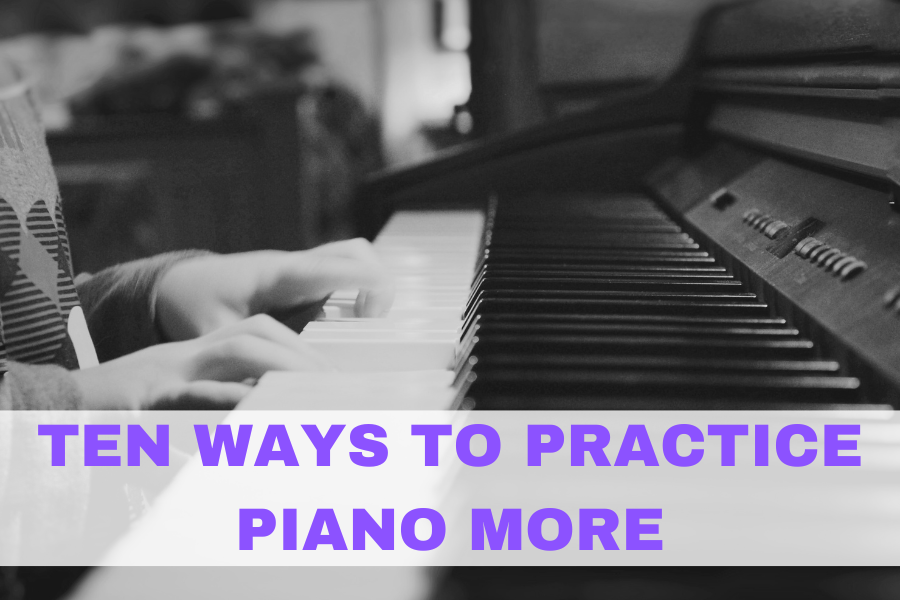Wondering how to practice piano more consistently? Here are ten ways to start practicing more.

Are you struggling to find time for piano practice? You’re not alone. Many aspiring pianists face challenges in maintaining a consistent practice routine.
In this blog post, I’ll explore ten effective strategies on how to practice piano more frequently and efficiently. Whether you’re a beginner or an advanced player, these tips will help you maximize your practice time and accelerate your progress.
I’m sharing ten ways to practice piano more.
This post is all about how to practice piano more often.
1. Use a Practicing App
In today’s digital age, there are numerous apps designed to help you practice piano more often and more effectively. These apps can provide structured lessons, track your progress, and even gamify your practice sessions. Some popular options include Modacity, Practice by Musopen, and Andante. By incorporating a practicing app into your routine, you can make your practice sessions more engaging and organized.
2. Find a Practice Buddy
Accountability can be a powerful motivator when it comes to how to practice piano more consistently. Grab a buddy for virtual or in-person practice sessions. You can set up regular times to practice together and report back to each other after each session. This not only makes practice more enjoyable but also helps you stay committed to your goals.
3. Turn Practice into a Game
Who says practice can’t be fun? Make your piano sessions more enjoyable by turning them into games. Create challenges for yourself, such as mastering a difficult passage within a set time limit or playing a piece without any mistakes. You can even use online platforms that offer piano-learning games to add an extra layer of excitement to your practice.
4. Schedule Your Practice Sessions
Sometimes, the simplest solution is the most effective. Schedule your piano practice just like you would any other important appointment. By setting aside dedicated time for practice, you’re more likely to follow through. Remember, consistency is key when it comes to how to practice piano more effectively.
5. Set Clear Goals
Having clear, achievable goals can significantly boost your motivation to practice piano more often. Whether it’s mastering a particular piece, improving your sight-reading skills, or preparing for a recital, setting specific goals gives your practice sessions purpose and direction.
6. Choose Interesting Repertoire
Learning something that genuinely interests you is a surefire way to practice piano more. When you’re excited about the music you’re playing, you’ll naturally feel more inspired and motivated to practice. Don’t be afraid to explore different genres and styles to find what resonates with you.
7. Just Sit Down and Start
Sometimes, the hardest part of practice is simply getting started. Make it a habit to sit down at the piano every day, even if it’s just for a few minutes. You’ll often find that once you start, you’ll want to continue playing longer than you initially planned.
8. Track Your Practice
Keeping a practice journal or using a tracking sheet can be incredibly motivating. It allows you to see your progress over time and identify areas that need more attention. You can use a paper version or a practice app to note down what you practiced, for how long, and any challenges or breakthroughs you experienced.
9. Reward Yourself
Positive reinforcement can be a powerful tool in encouraging more frequent piano practice. Set up a reward system for yourself. For example, after a week of consistent practice, treat yourself to something special. This can help create positive associations with your practice sessions.
10. Be Flexible with Practice Duration
Quality trumps quantity when it comes to how to practice piano effectively. Don’t force yourself to practice for long periods if it’s not productive. Instead, focus on short, focused practice sessions. Even 15-20 minutes of concentrated practice can be more beneficial than an hour of distracted playing.
Incorporating these strategies into your routine can significantly increase both the quantity and quality of your piano practice. Remember, the key to improvement lies not just in how often you practice, but also in how effectively you use that time.
By using practicing apps, finding a practice buddy, gamifying your sessions, scheduling regular practice times, setting clear goals, choosing interesting repertoire, just sitting down to play, tracking your progress, rewarding yourself, and being flexible with your practice duration, you’ll be well on your way to becoming the pianist you aspire to be.
Start implementing these tips today, and you’ll soon find yourself naturally gravitating towards the piano more often. Happy practicing!
This post was all about how to practice piano more.
